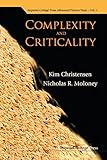[1] https://www.amazon.com/COMPLEXITY-CRITICALITY-Imperial-Colle...
You have to be careful about what kind of cellular automata you're talking about. There's the 'toy models' such as 1d and 2d cellular automata that Wolfram and Conway's Game of Life [2] fall into but there's also many others, including lattice gases and more complex modeling options. I assume you mean the cellular automata that have the flavor that Wolfram and Conway are talking about.
The linked Wolfram book is a 'classical' treatment where he introduces different classes (I,II,III and IV) of cellular automata, ranging from completely ordered (1d, rule 0, say) to completely disordered (1d, rule 32, say).
I hope I'm not rambling too much but from what I understand it was a commonly accepted that 'complexity happens at the edge of chaos' [2]. Wolfram's "A New Kind of Science" (again, from my understanding) essentially represents an evolving view (by Wolfram) where he graduates from "complexity happens at the edge of chaos" to "complexity is the norm, rather than the exception". Wolfram coins this as the "principle of computational equivalence" [3]. People have recommended ANKoS and I would really recommend against reading it. I think the principle of computational equivalence and the proof that rule 110 is Turing complete (given in ANKoS) are interesting but they're so buried in exceptionally bad writing as to be not worth the effort.
If you're interested in studying Conway's Game of Life [4] more, there's Golly [5], which is a wonderful piece of software. Cellular automata is a very large field and there are lots of different questions to ask about it, so you might want to limit your scope if you want more directed suggestions.
As a sort of tangential recommendation, I would highly encourage you to check out "Complexity and Criticality" by Christensen and Moloney [6]. Though they don't talk about the cellular automata that are described above, they motivate a lot of the different concepts of criticality, phase transitions and other motifs that show up repeatedly when discussing these models and others like them.
[1] https://www.amazon.com/Cellular-Automata-Complexity-Collecte...
[2] https://en.wikipedia.org/wiki/Edge_of_chaos
[3] http://mathworld.wolfram.com/PrincipleofComputationalEquival...
[4] https://en.wikipedia.org/wiki/Conway's_Game_of_Life
[5] http://golly.sourceforge.net/
[6] https://www.amazon.com/Complexity-Criticality-Advanced-Physi...


I found it pretty accessible from a programmers point of view.
[0] https://www.amazon.com/COMPLEXITY-CRITICALITY-Imperial-Colle...